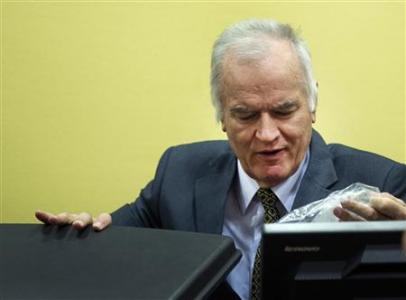(Reuters) – Bosnian Serb general Ratko Mladic went on trial for genocide on Wednesday, accused of leading the slaughter of 8,000 unarmed Muslim boys and men in Srebrenica in 1995, Europe’s worst atrocity since World War Two.

Mladic, now 70, appeared confident, flashing a thumbs-up and clapping his hands as he entered the courtroom in The Hague. Wearing a dark suit and tie, he sat, spectacles in hand, listening intently as prosecutors made their opening remarks.
Prosecutor Dermot Groome said Mladic and other Bosnian Serbs had divided the territory of the former Yugoslavia along ethnic lines and implemented a common plan to exterminate non-Serbs.
“The prosecution will present evidence that will show beyond a reasonable doubt the hand of Mr. Mladic in each of these crimes,” he said.
Mladic is the last of the main protagonists in the Balkan wars of the 1990s to go on trial at the International Criminal Tribunal for the former Yugoslavia in The Hague.
He is accused of orchestrating not only the week-long massacre in Srebrenica, at the time a U.N. “safe haven”, but also the 43-month siege of Sarajevo, in which more than 10,000 people were killed by snipers, machineguns and heavy artillery.
The list of charges stemming from his actions as the Serb military commander in the Bosnian war of 1992-95 ranges from genocide to murder, acts of terror and other crimes against humanity.
But Mladic, who was arrested last May after 16 years on the run, has dismissed the charges as “monstrous” and says he is too ill to stand trial. The court entered a “not guilty” plea on his behalf.
The case has inevitably stirred up violent emotions in the Balkans. Survivors watching earlier proceedings from the court gallery have shouted “Murderer!” and “Killer!” at a man nicknamed the “Butcher of Bosnia”.
Mladic has been angry and defiant during pre-trial hearings, heckling the judge, shouting and interrupting the proceedings.
“The whole world knows who I am,” he told a hearing last year. “I am General Ratko Mladic. I defended my people, my country … now I am defending myself.”
Mladic was in charge of the Bosnian Serb army when, over several days in July 1995, Serb fighters overran the Srebrenica enclave in eastern Bosnia, theoretically under the protection of Dutch U.N. peacekeepers.
Video footage shot at the time showed Mladic mingling with Muslim prisoners.
Shortly afterwards, the men and boys were separated from the women, stripped of identification, and shot.
BULLDOZED INTO GRAVES
The dead were bulldozed into mass graves, then later dug up with excavators and hauled away in trucks to be better hidden from the world, in dozens of remote mass graves.
Prosecutors say Mladic was part of a “joint criminal enterprise to eliminate the Bosnian Muslims in Srebrenica by killing the men and boys … and forcibly removing the women, young children and some elderly men”.
Mladic is also held responsible for the siege and bombardment of the Bosnian capital Sarajevo, which prosecutors said was intended to “spread terror among the civilian population”.
The horrors of the siege, together with the Srebrenica massacre, eventually galvanized world opinion in support of the campaign of Western air strikes on Bosnian Serb targets that brought the conflict to an end shortly after.
Mladic was indicted in 1995 along with Radovan Karadzic, the Bosnian Serbs’ political leader.
Yet both remained free in Serbia for more than a decade before being tracked down and sent to The Hague. Karadzic’s trial is already under way.
Defense lawyers say they have not had have enough time to review the huge case file prepared by prosecutors and asked for the trial to be postponed, but the request was denied.
Serge Brammertz, the court’s chief prosecutor, has dismissed Mladic’s assertion that he is too frail to sit through a 200-hour prosecution case involving testimony from 411 witnesses.
His appearance in The Hague is testament to the work of the tribunal, which has defied skeptics by managing, in the course of 19 years, to arrest all its 161 indictees.
But some victims still fear that Mladic, who has received physical therapy for a possible stroke, could escape judgment by dying in mid-trial.
Mladic’s mentor, former Serbian president Slobodan Milosevic, the architect of the Balkan wars, died in detention in 2006, a few months before a verdict in his trial for genocide and other war crimes in Croatia, Bosnia and Kosovo.
(Editing by Kevin Liffey)





